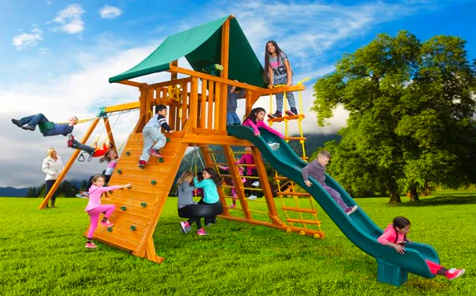Outdoor playgrounds offer more than just a place for kids to burn off energy. They are essential hubs for child development, community engagement, and promoting public health. Let's dive into the concrete benefits backed by data and specific examples that make outdoor playgrounds an invaluable addition to any community.
Enhanced Physical Health
Outdoor playgrounds are pivotal in combating childhood obesity, a pressing concern globally. According to the Centers for Disease Control and Prevention (CDC), about 13.7 million children and adolescents in the United States are affected by obesity. Playgrounds provide a fun and engaging way for children to engage in physical activity, which is recommended to be at least 60 minutes per day. Features like climbing walls, swings, and slides encourage kids to stretch, climb, and jump, which enhances their muscle development and coordination.
Cognitive and Social Skills Development
Playgrounds don't just exercise bodies; they challenge minds. As per a study published in the "American Journal of Play," kids develop crucial cognitive skills such as problem-solving and creativity when they interact in a less structured environment, like that of an outdoor playground. The dynamic nature of outdoor play allows children to learn negotiation skills, teamwork, and empathy as they navigate sharing space and toys with peers. This kind of social interaction is critical for building communication skills and self-confidence.
Connection with Nature
In today's digital age, children spend a significant amount of time indoors, often in front of screens. Outdoor playgrounds provide an essential connection to the natural world. Exposure to outdoor environments has been linked to reduced stress levels in children, according to research from the University of Colorado. Playing outside also helps children appreciate the environment and promotes ecological awareness from a young age.

Accessibility and Inclusivity
Modern outdoor playgrounds are designed to be inclusive, providing equipment that is accessible to children of all abilities. Inclusive playground designs often feature ramps for wheelchairs, sensory-friendly activities for children with autism, and visually engaging components for those with visual impairments. This inclusivity ensures that every child, regardless of their physical or mental abilities, can enjoy and benefit from playground activities.
Economic and Community Value
Outdoor playgrounds also offer substantial economic benefits. They increase the attractiveness of a community, which can lead to higher property values. A study from the National Recreation and Park Association showed that parks and recreational facilities are among the top three city services considered when families are deciding where to live. Moreover, playgrounds serve as communal hubs where parents and neighbors can meet and build social ties, fostering a stronger sense of community and belonging.
Conclusion: The Transformative Impact of Outdoor Playgrounds
In summary, outdoor playgrounds are not just play areas—they are vital for the health and development of children, they foster community ties, and they enhance the quality of life in neighborhoods. By offering a space where children can physically play and socially interact in a natural setting, outdoor playgrounds craft healthier, happier communities. To explore various equipment that can transform any space into a thriving outdoor playground, click the link.